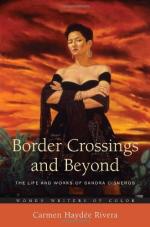|
This section contains 2,478 words (approx. 9 pages at 300 words per page) |

|
SOURCE: Muske, Carol. “Breaking Out of the Genre Ghetto.” Parnassus: Poetry in Review 20, no. 1-2 (fall 1995): 409-11, 417-23.
In the following essay, Muske celebrates Cisneros for resisting the constraints of genre by writing poems that speak naturally and prose that sings.
Why do most American graduate writing programs ghettoize poetry and fiction? Why do poets and fiction writers support this isolationism? It's obvious that poetry and fiction are different genres, but why should this lead to specialized education and aesthetic suspicion, literary territoriality akin to gang partition: Blood turf, Crip turf? Why, in my early years as a writer in New York City, did my poet-friends label fiction writers “word-creepers” (a term corrupted from Roethke) and novelists scorn poets as “word-wankers?” (Or was it the other way around?) Or did I just make up this “poetic” notion that the Word itself is split into active discourse and ecstatic...
|
This section contains 2,478 words (approx. 9 pages at 300 words per page) |

|


